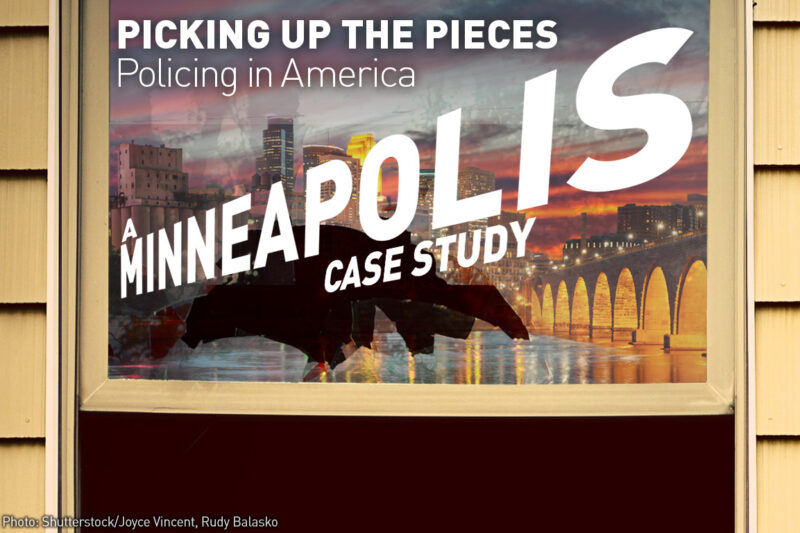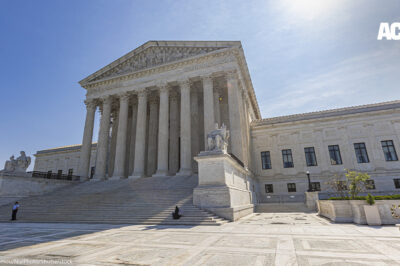
Being Black in America today is rough. Turns out being Black and living in Minneapolis, Minnesota, doesn't make it any easier. Often appearing on "Top 10 Best Places to Live" lists, Minneapolis is billed as a progressive, accessible American city, where residents can work, raise families, and generally live out their own American dream. But if you're a person of color or of a lower socioeconomic status (or, even worse, both) living in Minneapolis, the numbers tell a different tale – indeed, a tale of two cities.
"Picking Up the Pieces - Policing in America, A Minneapolis Case Study" is an in-depth look at policing in Minneapolis that explores the who, what, when, where, why and how low-level arrests occurred in Minneapolis during a 33-month time span. In recent months the ACLU analyzed data on low-level arrests made by the Minneapolis Police Department between January 2012 and September 2014. To be clear, low-level offenses are those that carry a maximum penalty of one year in jail, a maximum fine of $3000, or both, if convicted. Many of these offenses are punishment by only a fine.
Results of the ACLU data crunch are staggering, and they make it clear that the most vulnerable populations living in Minneapolis are being policed differently than the more fortunate, resulting in a Minneapolis divided.
According to the data, Black people in Minneapolis are 8.7 times more likely to be arrested for a low-level offense than a white person. Native Americans are 8.6 times more likely to be arrested. And it doesn't end there.
Youth and homeless populations bear the brunt of unequal policing as well. Black and Native American youth are 5.8 times and 7.7 times more likely, respectively, to be arrested for a low-level offense than white youth. Furthermore, 40 percent of all youth arrests in Minneapolis are for curfew violations. Instead of pushing kids into the jaws of the criminal justice system, law enforcement should guarantee their safety by bringing them home to their parents or to another safe place.
These arrests, and their attendant racial disparities, are not inevitable. Rather they appear to be the product of racially biased policing and broken police practices. Whether caused by implicit or explicit bias, the result is the same. Communities of color in Minneapolis are being pushed further to the margins.
Moreover, the quality and fairness of every interaction with police officers has wide-ranging implications, according to Anthony Newby, the executive director of Neighborhoods Organizing for Change in North Minneapolis. "Political power starts with the police," he explains. "And that's most people's front-line experience with the government. And when that's negative, and consistently negative, it informs people's everyday experience and generally makes people withdraw from wanting anything to do with politics or political power."
Sadly, any entry point into the American criminal justice system today is a pathway to a more difficult life. Those arrested bear the punishments directly imposed, as well as collateral consequences that can snowball and follow them around, sometimes for life. The financial burdens of fines and fees, loss of employment, ineligibility for certain jobs, the potential housing and financial aid penalties, the social stigma, and the stress of navigating through the criminal justice maze wear people down and make it significantly more difficult to achieve a healthy, fruitful existence.
Moreover, a recent study by the Vera Institute of Justice demonstrated how spending as few as a couple days in jail can "increase the likelihood of a sentence of incarceration and the harshness of that sentence, reduce economic viability, promote future criminal behavior, and worsen the health of the largely low-risk defendants who enter them—making jail a gateway to deeper and more lasting involvement in the criminal justice system at considerable costs to the people involved and to society at large." Simply put, by unfairly targeting the most vulnerable populations for low-level arrests, police in Minneapolis are making it harder for its own communities to succeed.
Law enforcement exists to serve and protect. But arresting a homeless man of color for panhandling or a young person for a curfew violation doesn't further this goal. These kinds of arrests achieve the opposite, pushing people further away from health, wealth, and opportunity.
The ACLU has offered recommendations to officials in Minneapolis, and they have taken note. But much more work lies ahead.
Everyone in Minneapolis has the same right to be free from unequal treatment by the police. Now is the time for Minneapolis to seize the opportunity and build stronger, more inclusive community-police relations, guaranteeing that constitutional rights don't apply to only some people in some parts of the city. Only then can a tale of two cities become a story of one Minneapolis — unified, fair, and equal.
For more information on "Picking Up the Pieces, Policing in America: A Minneapolis Case Study," click here: feature/picking-pieces.



